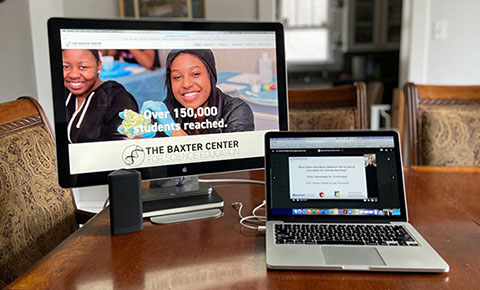The Baxter Center Launches Virtual Learning Series for Science Teachers
 Nearly two dozen middle and high school educators joined the weekly Baxter Center for Science Education’s teacher virtual learning series to discuss research-based principles for online learning and the challenges associated with moving to remote classes.
Nearly two dozen middle and high school educators joined the weekly Baxter Center for Science Education’s teacher virtual learning series to discuss research-based principles for online learning and the challenges associated with moving to remote classes.
The 30-minute webinar was led by Northwestern University’s Ashley Walter, program and partnership coordinator at the Office of Community Education Partnerships; and Jen Richards, research assistant professor at the School of Education and Social Policy. After the webinar, Walter and Richards held “office hours” so educators could stay connected, ask questions, and learn from one another.
The new ongoing series was started last week to support educators, which is the overarching goal of the Baxter Center for Science Education. Launched in 2009 at Lindblom Math & Science Academy, the Baxter Center is a partnership between the Baxter International Foundation, Lindblom in Chicago Public Schools, Round Lake High School, and Northwestern University’s Office of Community Education Partnerships.
Every Wednesday, the Baxter Center for Science Education will introduce a bite-sized video of 10 minutes or less on a current topic. The following Thursday, the Baxter Center will host a free 30-minute meet-up so educators can discuss the previous day's video, what they are personally experiencing, and what they are seeing with students on that topic.
The video can be accessed on the Baxter Center for Science Education website. This week’s meet-up session at 2 p.m. (CT) Thursday, April 16, will feature Baxter Center facilitator and Whitney Young Magnet High School teacher Mary Clark, who will lead a live discussion and post a video on strategies she is using to adapt her biotech class to an online learning setting.
During last week's pilot session, participants watched the video “Five Research-Based Principles for K-12 Online Teaching." The majority of educators said they were still learning how to adjust to online/remote teaching and are interested in ongoing professional development.
In an informal poll, they chose multiple foci for future sessions: strategies for translating classroom best practices to online learning (83 percent), examples of online resources (75 percent), and connecting with other teachers across schools (6 percent).
The educators discussed the challenges that come with virtual classes and how tthe absence of grading might impact motivation. Teachers also shared strategies. One Chicago Pubic Schools teacher said she invites her students’ parents into her Google classroom. “Parents have to be part of it,” she said.
Have an idea for the series? Reach the Baxter Center for Science Education via Twitter (@BCSE_NU) or email, at bcse@northwestern.edu.